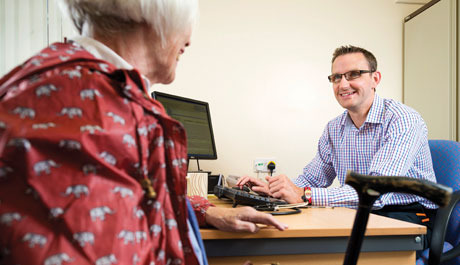GPs should routinely ask older people about falls, says NICE

NICE chiefs are urging GPs to ask older people about falls during routine appointments, under a new set of standards aimed at cutting down on hundreds of thousands of hospital admissions due to falls injury.
Under the new diktat, NICE says GPs should ‘ask older people whether they have fallen in the past year; about the frequency, context and characteristics of any falls; and if they ever lose their balance or feel unsteady on their feet’.
GPs are advised they should refer people at risk of falls for further assessment by specialists, who should carry out a ‘multifactorial falls risk assessment’.
But the new standard adds GPs should ‘communicate in a way that recognises that some older people are reluctant to admit to falling, and do not repeat questions about falls if a person has recently been asked’.
NICE said three in 10 people over 65 will fall at least once a year, and, while most falls do not result in seirous injury, around 255,000 older people are admitted to hospitals in England due to falls every year, costing the NHS some £2.3bn.
Dr Victoria Welsh, a GP who helped draw up the standards, said: ‘Falls in later life are burdensome for individuals, their families and communities.
‘Whilst falls may result in serious injury, such as hip fracture, they may also be the first indication of an underlying health issue. This quality standard prioritises the need to identify those at risk of falls, and assess and manage their associated factors so that we can prevent falls from happening in the first place.’
But the RCGP warned that under-pressure GPs are unlikely to have time to fit this into routine appointments.
RCGP chair Professor Helen Stokes-Lampard said that ’implementing this new guidance will undoubtedly be hampered by the standard 10-minute GP consultation, which is increasingly inadequate, particularly for older patients who are often living with multiple, long term conditions’.
Professor Stokes-Lampard added: ‘GPs want to spend longer with our older patients so that we can discuss things with them like how to avoid falling – but in many cases this won’t be the reason a patient has come to visit the GP, and it’s incredibly hard to do everything that we should do whilst respecting the patient and their reason for visiting us.
’Nevertheless, it is essential that we do use all the opportunities we have with our older or more frail patients to establish whether they are susceptible to falling, and work with colleagues across health and social care to ensure they receive the most appropriate care and support. We also welcome initiatives that allow GPs to spend longer with patients with multiple health problems.’
NICE quality standard – falls prevention
The newly updated quality standard includes three new statements as follows:
- Older people are asked about falls when they have routine assessments and reviews with health and social care practitioners, and if they present at hospital;
- Older people at risk of falling are offered a multifactorial falls risk assessment;
- Older people assessed as being at increased risk of falling have an individualised multifactorial intervention.
Source: NICE Quality Standard – Falls in older people
Visit Pulse Reference for details on 140 symptoms, including easily searchable symptoms and categories, offering you a free platform to check symptoms and receive potential diagnoses during consultations.









